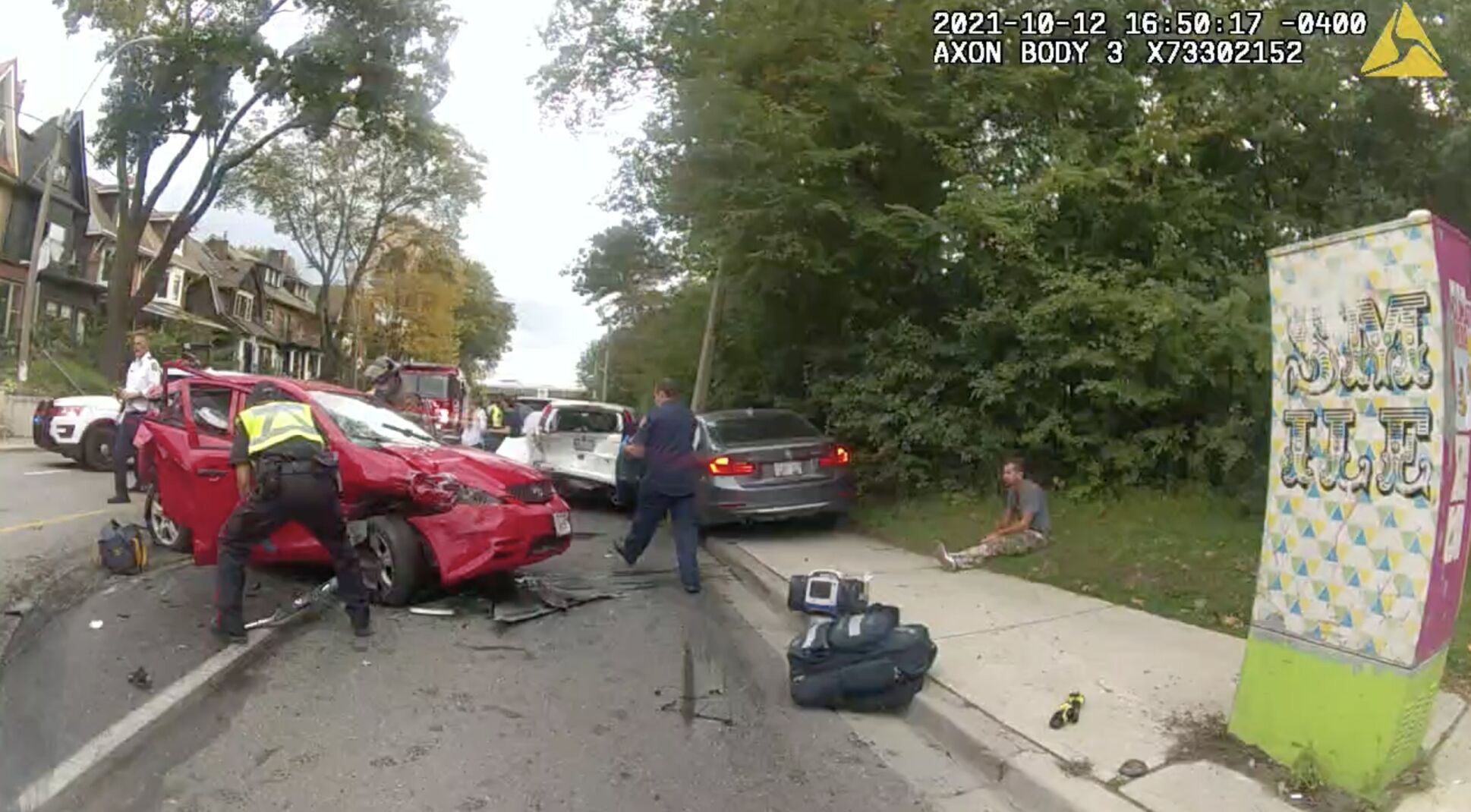A chain-reaction car crash that left two people dead on Parkside Drive three years ago was the “tragic”┬áresult of a loss of consciousness suffered by driver Artur Kotula ÔÇö not any criminal act, his defence lawyer said in closing arguments in court on Friday.┬á
Kotula, 41, has pleaded not guilty to two charges of dangerous driving causing death or bodily harm, for the Oct. 12, 2021 crash.
The accusedÔÇÖs BMW 320i was travelling at a high rate of speed, in a 50 km/h zone on Parkside Drive, when it hit a red Toyota Matrix before hitting another car, causing subsequent collisions and then colliding with a pole.
Valdemar Avila, 71, was pronounced dead at the scene, while Fatima Avila, 69, was transported to hospital and died a short time later.
A police officer’s body camera footage, admitted as evidence, showed the chaotic aftermath, with first responders cutting someone out of the Matrix, who subsequently received chest compressions. Bystanders, as well as people and cars involved in the crash were shown surrounding the area. Kotula can be seen sitting on the grass behind his vehicle.
ÔÇťThis is a tragic event, but the consequences of the collisionÔÇŁ are not proof Kotula acted with criminal intent, defence lawyer Justin Marchand told Judge Suhail┬áAkhtar, who is presiding over the case.
The defence argued that Kotula lost consciousness and did not remember the time around the crash at all.
Kotula has testified he previously suffered seizures due to alcohol withdrawal.
The prosecution has accused him of fabricating that explanation after learning the couple had died as a result of the crash.
One issue under scrutiny at the trial is Kotula’s account that┬áhe had blurry vision before blacking out in his car, something he did not mention in the immediate aftermath of the crash, or at the scene.
The defence attorney pointed out two reports in which Kotula days after the collision talked about blurred vision, allegedly before he learned of the deaths. The lawyer criticized the CrownÔÇÖs position that Kotula had made up the story.
ÔÇť(The prosecution) is based on circumstantial evidence,ÔÇŁ said Marchand. ÔÇťThe allegation of fabrication doesnÔÇÖt stand up to scrutiny.ÔÇŁ
The defence had an expert, Dr. Bernd Pohlmann-Eden, testify that in his opinion, it is probable Kotula had a seizure. But the Crown questioned his report, asserting it was biased since it was written on the accusedÔÇÖs behalf and also that he relied on medical reports and only interviewed the accused years after the crash, and only via video call.
Another element in dispute is testimony from the collision reconstruction specialist, who noted that the brake on Kotula’s car was pressed seconds before the crash.
The Crown has contended this shows Kotula was in control of his actions. 
But Marchand pointed to the testimony of his expert, who said a seizure was probable and that the braking reaction could be possible.
ÔÇťThis court has the benefit of a world-class seizure expert to confirm the fact that there would be these fine motor movements that could help explain this circumstance,ÔÇŁ Marchand said.
Marchand tried to bolster Pohlmann-EdenÔÇÖs testimony by pointing to medical reports about Kotula’s previous seizures and how some of his readings were similar to those that came the days after the Parkside Drive crash.
The judge, meanwhile, on Friday called into question some of KotulaÔÇÖs testimony, and some of what he recalled and to whom.
Marchand initially said his defence submission would take an hour, but he spoke for three-and-a-half hours, which the judge seemed to understand.
“It’s a tricky case and it needs the attention that both sides are giving it,” said Justice Akhtar.┬á
The case returns to Ontario Superior Court for the Crown’s final submissions on Monday.┬á





























To join the conversation set a first and last name in your user profile.
Sign in or register for free to join the Conversation